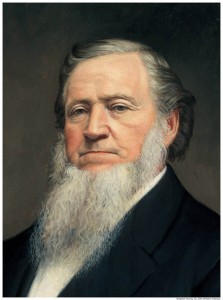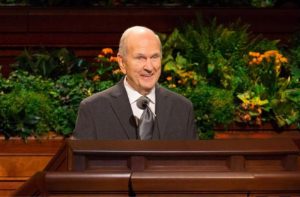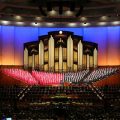The Church of Jesus Christ of Latter-day Saints teaches that God’s prophets today, like those we read of in the Bible, are authorized to speak on God’s behalf for the entire church. Often, people who are not Latter-day Saints find this concept amazing or even alarming. They wonder how we know if they’re telling us the truth. We are often asked silly questions like, “If your prophet told you to only wear blue, would you?”
Brigham Young had an answer for this question. He’s said to have told people his greatest fear was that people in the Church would start to take what he said as the will of God and not take the time to go to God personally to receive confirmation of it.
Although the Saints are taught to honor their prophets and to follow them, it’s not a blind following. Only God can be completely trusted to always tell you the truth, and only God knows the truth of all things. Latter-day Saints are taught even before they join the Church to pray and ask God if the current prophet really is God’s prophet. Then, afterwards, at any time, they can return to God and ask about specific teachings the prophet has given.
In the case of those hypothetical situations the Saints are always being asked about, a member who reads an article by a Church leader will generally follow this pattern:
Before reading or listening, they pray for the Spirit. This will often tell them what is true while they’re receiving the information. Once they receive the counsel, they place it in context of other teachings they’ve received. For instance, if the prophet said to store food away so you’ll have enough to eat if you lose your job, a member would say, “Oh, I’ve heard that many times before and already know it’s true.” He wouldn’t likely take time to pray about this, since it’s repeated often.
If it’s new counsel, he might compare it to see if it fits in with previous teachings. For instance, prophets often tell us to store wheat. If this were the first time we’d been told to store wheat, we might think to ourselves, “Well, that’s the first time wheat’s been mentioned, but we’ve often been told to store food in general, so I’ll just add that to it.” It fits into previously given counsel.
However, if a member heard entirely new counsel, and just couldn’t quite feel comfortable with it—maybe because it would require him to stop doing something he loved—he could then take it to God in prayer. Following the established pattern for prayer, he would study the problem in his mind, come to a decision (probably based on what he already knows about God and the gospel), and then come to a conclusion. He’d then kneel in prayer and ask God if he’s made the right choice.
Spencer W. Kimball, a past prophet, spoke on the subject of blind faith.
“When men obey commands of a creator, it is not blind obedience….God’s every command is righteous, every directive purposeful, and all for the good of the governed. …
Is it blind obedience when one regards the sign “High Voltage-Keep Away” or is it the obedience of faith in the judgment of experts who know the hazard?
Is it blind obedience when the air traveler fastens his seat belt as that sign flashes or is it confidence in the experience and wisdom of those who know more of hazards and dangers?
Is it blind obedience when the little child gleefully jumps from the table into the strong arms of its smiling father, or is this implicit trust in a loving parent who feels sure of his catch and who loves the child better than life itself? …
Is it then blind obedience when we, with our limited vision, elementary knowledge, selfish desires, ulterior motives, and carnal urges, accept and follow the guidance and obey the commands of our loving Father who … created a world for us, loves us, and has planned a constructive program for us, wholly without ulterior motive, whose greatest joy and glory is to “bring to pass the immortality and eternal life” of all his children? [See Moses 1:39.]
It is not blind obedience, even without total understanding, to follow a Father who has proved himself.” (”Chapter 13: Obedience Born of Faith in God,” Teachings of Presidents of the Church: Spencer W. Kimball, (2006),135-44
In the case of the hot stove, it’s likely a child touched a hot stove against the advice of a parent at some time in his childhood. Having done so, he learned first that stoves can be hot, and secondly, that parents can be trusted. Over time, as his parents continued to be right about physical danger, it’s likely he stopped feeling the need to touch every stove or try out every dangerous thing. Whereas, as a toddler, he might have heard a parent say the stove was hot, but he had to find out for himself. As an eight-year-old, if his parents told him it was too dangerous to go outside in the current weather conditions, he might obey without first testing, having learned his parents were usually right.
In the same way, Latter-day Saints learn to trust their prophets, and they learn to trust God. A new member is likely to pray about every individual doctrine, but a more seasoned member, having learned that when he prays, God always answers, “Yes, the prophet is right,” no longer needs to do this. He can spend his limited life doing more important things. He saves his confirmation prayers for those situations which leave him uncertain or which require greater sacrifice to carry out.
Being able to turn to God is one way God protects his children from unscrupulous leadership. They need never take anyone’s word for any part of the gospel, but can always go directly to the source. The prophet delivers God’s message and guides the Church, but each member is individually responsible for confirming the truthfulness of what they’re being told.
Someone just learning about the Church through Latter-day Saint missionaries will be taught how to pray almost immediately. Then, after each lesson, he will be asked to pray about it privately to know for himself it’s true, rather than taking the word of the missionaries. This is a critical step in the member’s progression, because someone who does this is far less likely to fall away from the Church in the future. His testimony will be based on a firm foundation—God.
This article was originally published in March 2009. Minor changes have been made for consistency.
Lead image via Church News.
About Terrie Lynn Bittner
The late Terrie Lynn Bittner—beloved wife, mother, grandmother, and friend—was the author of two homeschooling books and numerous articles, including several that appeared in Latter-day Saint magazines. She became a member of the Church at the age of 17 and began sharing her faith online in 1992.










Trackbacks/Pingbacks